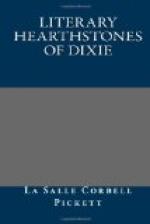The same majestic pine is
lifted high
Against the twilight
sky,
The same low, melancholy music
grieves
Amid the topmost
leaves,
As when I watched and mused
and dreamed with him
Beneath those
shadows dim.
Such dreams we can dimly imagine sometimes when we stand beneath a glorious pine and try to translate its whisperings into words, and watch “the last rays of sunset shimmering down, flashed like a royal crown.” Sometimes we catch glimpses of such radiant visions when we stand in the pine shadows and think, as Hayne did so often after that beautiful August, “Of one who comes no more.” Under that stately tree he
Seemed to drink the sunset
like strong wine
Or, hushed in
trance divine,
Hailed the first shy and timorous
glance from far
Of evening’s
virgin star.
In all his years after, Paul Hayne held in his heart the picture of his friend with head against that “mighty trunk” when
The unquiet passion died from
out his eyes,
As lightning from
stilled skies.
So through that glowing August on Copse Hill the two Southern poets walked and talked and built their shrine to the shining Olympic goddess to whom their lives were dedicated.
When summer had wrapped about her the purple and crimson glories of her brilliant life and drifted into the tomb of past things, Timrod left the friend of his heart alone with the “soft wind-angels” and memories of “that quiet eve”
When, deeply,
thrillingly,
He spake of lofty hopes which
vanquish Death;
And on his mortal
breath
A language of immortal meanings
hung
That fired his
heart and tongue.
[Illustration: HOUSE WHERE TIMROD LIVED DURING HIS LAST YEARS 1108 Henderson Street, Columbia, S.C.]
Impelled by circumstances to leave the pines before their inspiring breath had given him of their life, he had little strength to renew the battle for existence, and of the sacrifice of his possessions to which he had been forced to resort he writes to Hayne: “We have eaten two silver pitchers, one or two dozen silver forks, several sofas, innumerable chairs, and a huge bedstead.”
We should like to think of life as flowing on serenely in that pretty cottage on Henderson Street, Columbia, its wide front veranda crowned with a combed roof supported by a row of white columns. In its cool dimness we may in fancy see the nature-loving poet at eventide looking into the greenery of a friendly tree stretching great arms lovingly to the shadowy porch. A taller tree stands sentinel at the gate, as if to guard the poet-soul from the world and close it around with the beauty that it loved.
But life did not bring him any more of joy or success than he had achieved in the long years of toil and sorrow and disappointment, brightened by the flame of his own genius throwing upon the dark wall of existence the pictures that imagination drew with magic hand upon his sympathetic, ever responsive mind. On the sixth of October, after that month of iridescent beauty on Copse Hill, came the days of which he had written long before:




